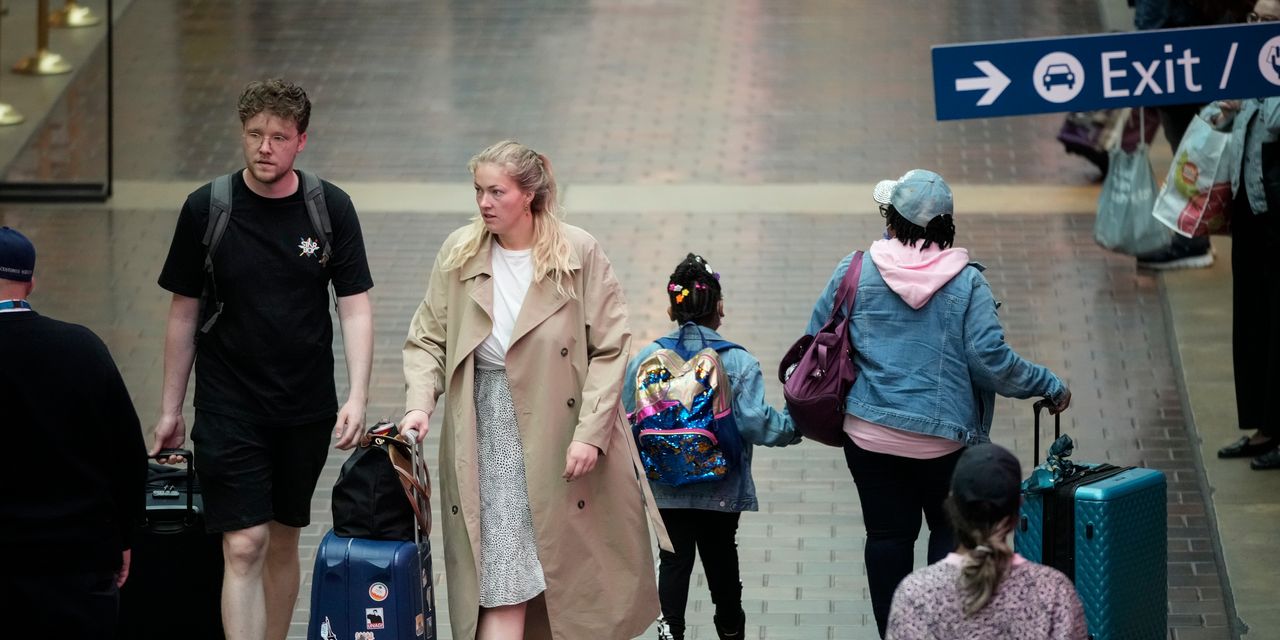Traveling this Memorial Day Weekend? Put some deep breaths on your checklist.
Americans should brace for jammed highways and long airport lines with more people projected to drive and fly this holiday weekend compared to last year, experts say.
Gas is $1 cheaper than it was at the same point last year and airline passengers aren’t flinching from pricey tickets, still powered by the pent-up demand to see family and friends as the pandemic recedes.
“The roads are going to be pretty packed,” said AAA spokeswoman Aixa Diaz. “The bottom line is, the later you wait in the day, the worse it is — unless you drive at night.”
“If there ever was a time you wanted to get to the airport early, it’s this one,” she added.
“Whether driving or flying, pack your patience and prepare for heavy traffic on the road and at the airport,” said Erika Richter, spokeswoman for the American Society of Travel Advisors.
“AAA is projecting that 37.1 million people will be driving at least 50 miles this upcoming weekend. That’s 2 million more people traveling by automobile compared to last year.”
AAA is projecting that 37.1 million people will be driving at least 50 miles this upcoming weekend. That’s 2 million more people traveling by automobile compared to last year.
They’ll be driving on cheaper gas. Nationally, a gallon of gas averaged $3.57 on Friday, down from $4.59 one year ago, AAA said.
Meanwhile, nearly 3.4 million airline passengers are projected to fly this weekend, according to AAA. That would surpass pre-pandemic levels, when 3.2 million people flew over the Memorial Day Weekend in 2019.
All together, 42.3 million people are expected to travel this weekend via cars, planes, buses, trains, according to AAA estimates. That’s higher than the 39.6 million who traveled last Memorial Day Weekend, and just under 2019 levels.
Three major airlines, American Airlines
AAL,
United
UAL,
and Delta Air Lines
DAL,
are expected to handle nearly 60% of the flights, according to a Thursday note from TD Cowen.
Like others, analysts at TD Cowen, a division of TD Securities, say it’s going to be a brisk summer travel season.
“We continue to see strong demand for air travel, with this summer’s focus on international [travel]. Remember, the U.S. government did not eliminate testing until mid-June last year, after most people planned their vacations,” they wrote.
Related: Is it possible to book a cheap summer flight? Here are 5 tricks to save money.
When to expect the worst?
Friday is the day when roads and airports are going to be the busiest.
On the roads, congestion is going to peak that day from 3:00 p.m. to 6:00 p.m., according to INRIX, a traffic-data analytics firm.
Inside airports, approximately 2.6 million people will pass through Transportation Security Administration checkpoints that day, the agency said.
During last year’s Memorial Day Weekend, 2.38 million people passed through TSA checkpoints, the agency’s data showed.
Teens, aged 13-17, can now go with TSA PreCheck-enrolled parents and guardians, when they are on the same reservation and when the TSA PreCheck indicator shows on the child’s pass. Children ages 12 and under can still walk through checkpoints with their enrolled parents or guardians.
Once getting on the plane, don’t count on having a nearby spare seat. Seating capacity is currently slated to be 17% higher than last Memorial Day Weekend, according to the travel app Hopper.com.
This weekend, last-minute tickets are averaging $273, and that’s around $100 less than ticket-price averages at the same point last year and slightly cheaper than 2019 levels, Hopper.com’s data said. International travel is a different story. Fares to Europe, for example, are more than 50% higher than last year, according to Hopper.com.
What happens after Friday?
On the roads, there’s little extra traffic expected on Saturday and Sunday, according to projections from INRIX, a transportation analytics company. On Monday, the worst traveling time is 12 p.m. to 3 p.m. The window for less traffic that day is before 10 a.m., INRIX noted.
As for flights, Richter said airlines and operators “are obligated to share the latest information if it impacts your travel.”
Downloading smartphone apps for your airline, activating the notifications and opting for text and email alerts will also help keep you abreast of any last-minute changes, she said.
Through March, less than 2% of scheduled domestic flights have been canceled, the U.S. Department of Transportation said Tuesday. That’s below last year’s 2.7% cancellation average and the 4.1% rate for the first three months of 2022, the department noted.
A Transportation Department dashboard shows which airline carriers have committed to passenger-friendly accommodations when delays and cancellations occur. For example, some — but not all — airlines will rebook your flight with a partner airline at no additional cost.
But Richter said the volume and potentials for travel snags this Memorial Day Weekend could be a preview for the months to come. “Travel delays will be inevitable this summer, so make sure you are planning ahead,” she said.
Read also: Why this falling fuel price is stoking recession fears even as prime gas-demand season nears
Read the full article here




